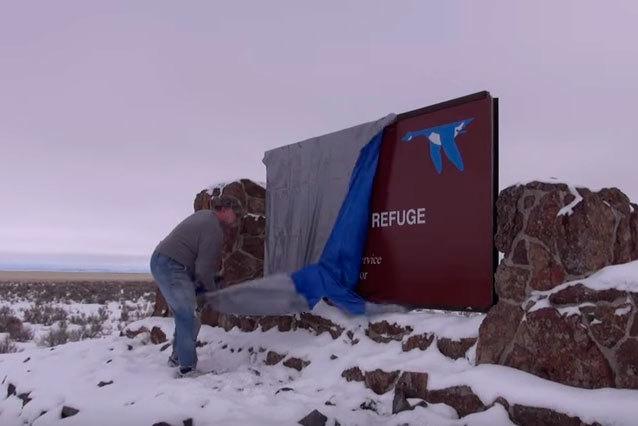Mark Heckert, a biologist and environmental consultant based in Puyallup, went to college in Oregon and had been following Bundys’ anti-government actions for years prior to their occupation of the Malheur Wildlife Refuge last January.
So when he heard about the occupation, he hit the road to Eastern Oregon to stand in opposition to the ideology the Bundys were spouting.
“Someone conducting an armed takeover of government facilities in America. It still catches in my throat to say that,” he says today. “There didn’t seem to be much astonishment in the general public about this, so I had to go down and make my opinion known.”
He talked to a few of the occupiers, to little avail. “It was me telling them to get the fuck out of there and them telling me the Constitution said they didn’t have to.”
Heckert quickly became a known face around the occupation, crowding in on the occupiers’ press conferences with signs that said things like “Get the flock outta my wildlife refuge.” A photo of him tearing down a banner the occupiers had put up made the rounds on the web.
When we caught up with Heckert on the phone Friday, he hadn’t slept and was audibly emotional. Less that 24 hours earlier, a jury in Oregon had found the seven leaders of the occupation not guilty of federal conspiracy charges brought against them. For Heckert, the acquittal represents a validation to the Bundys’ way of thinking, which in turn he thinks could bring an end to public lands as we know them.
“This can do nothing but encourage the thought that nothing the government does is good,” he says. “Bundy and his ilk have put a target on land managers’ backs and said ‘open season.’”
In light of the verdict, Heckert plans on actively engaging people who use wildlife refuges and other public lands to start standing up for them—to reassert that public lands are a cornerstone of American life.
“I just want to wake people up,” he says. “Public land is a foundational thing for me. For me to realize it that this can get taken away…”
Heckert is referring to the idea of the federal government transferring large tracts of land to state control—which the Bundys were calling for at the Malheur Wildlife Refuge. It’s not as fringe an idea as it may seem. Federal land transfers are becoming a mainstream talking point for Republicans, and a leader of the movements says presidential candidate Donald Trump has been receptive to the idea (Trump’s campaign itself has remained more agnostic publicly). The ruling will surely encourage the movement.
“If I was on that side I’d say OK, ratchet it up. All I can think is that they’ll be doing more of the same damn thing,” Heckert says.
Heckert says the images of people waving guns at federal land managers and a presidential nominee threatening to not accept the election outcomes are all part of a disturbing trend in America.
“We’ve got a guy running for president who said if I don’t win this election, maybe I should just take it,” he says, choking up. “My son’s in the 101st [Airborne], and I would hate to see this evolve, and I don’t see it getting any better, and I really don’t know what to do about it. So that’s it.”








